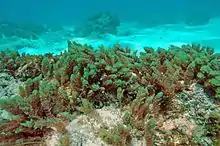Asparagopsis
Asparagopsis is a genus of edible red algae,[1] not to be confused with Asparagus (genus), which is a terrestrial vegetable. Asparagopsis armata is a found in temperate waters, while Asparagopsis taxiformis thrives in tropical and subtropical climates.
| Asparagopsis | |
|---|---|
 | |
| Asparagopsis taxiformis in Mayotte. | |
| Scientific classification | |
| (unranked): | Archaeplastida |
| Division: | Rhodophyta |
| Class: | Florideophyceae |
| Order: | Bonnemaisoniales |
| Family: | Bonnemaisoniaceae |
| Genus: | Asparagopsis Mont. |
Uses
Like all macroalgae, Asparagopsis contains bromoform, a halogen compound which is known to inhibit methane production in ruminants. Because of its high bromoform content, Asparagopsis has proven to be very effective in inhibiting methane production in livestock, with experiments slashing emissions by 99%. Several companies are producing Asparagopsis for use as a feed additive for the livestock industry.[2]
A collaborative study conducted in Australia by Meat and Livestock Australia, CSIRO and James Cook University, confirmed the effectiveness of Asparagopsis in reducing methane emissions.[3] Emissions were reduced by 80% when Asparagopsis accounted for 3% of the cattle's feed.[4][5]
Research award
In 2020 an Asparagopsis-based food supplement FutureFeed won a Food Planet Prize worth $1 million.[6] The importance of the product is that it reduces powerful greenhouse gases produced by cattle as they digest their food. The winners said it would use the prize money to create an international commercial fund to help First Nations communities generate income from cultivating and selling the seaweed."[7]
References
- "Asparagopsis Montagne, 1840 :: Algaebase". www.algaebase.org. Retrieved 2020-11-13.
- "Is seaweed the solution to agriculture's methane problem?". Phyconomy. Retrieved 2020-11-13.
- "Aussie seaweed stops cows farting, cancels carbon footprint". Australian Financial Review. 2020-03-08. Retrieved 2020-11-18.
- Burreson, B. Jay; Moore, Richard E.; Roller, Peter P. (1976-07-01). "Volatile halogen compounds in the alga Asparagopsis taxiformis (Rhodophyta)". Journal of Agricultural and Food Chemistry. 24 (4): 856–861. doi:10.1021/jf60206a040. ISSN 0021-8561.
- Genovese, Giuseppa; Tedone, Laura; Hamann, Mark T.; Morabito, Marina. "The Mediterranean Red Alga Asparagopsis: A Source of Compounds against Leishmania". Marine Drugs. 7 (3): 361–366. doi:10.3390/md7030361. PMC 2763106. PMID 19841720.
- "The 2020 Food Planet Prize Awards; doubling down to reshape and scale up". Food Planet Prize. December 2020.
- Marchant, Gabriella (19 December 2020). "Australian 'super seaweed' supplement to reduce cattle gas emissions wins $1m international prize". ABC News.